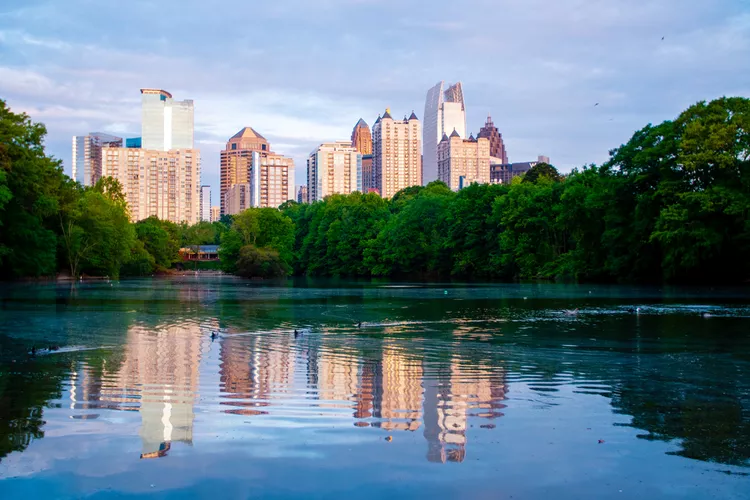Summary
Best Times to Visit Atlanta, Georgia
Travelers’ reasons for visiting Atlanta, Georgia vary widely, encompassing family-friendly attractions like the Georgia Aquarium and Zoo Atlanta, as well as recreational sports, museums, live music, and the city’s thriving culinary scene. Given its extensive appeal and accessibility, with 2,700 flights arriving and departing daily from Hartsfield–Jackson Atlanta International Airport, it is no surprise that Atlanta experiences an extended high season.
Seasonal Overview of Atlanta
- High Season: May through December
- Shoulder Season: March and April
- Low Seasons: January and February
While you may not completely escape Atlanta’s notorious traffic during your visit, you can optimize your time by planning ahead, especially when it comes to purchasing tickets for attractions or events. “If traveling on weekends, expect busy conditions at tourist highlights — such as the Georgia Aquarium, World of Coca-Cola, and the Atlanta Botanical Garden,” advised Lindsey Ritchie, lead concierge at Four Seasons Hotel Atlanta.
The Best Times to Visit Atlanta, According to Locals
Weather significantly influences your overall experience in Atlanta. Most locals concur that the most enjoyable weather occurs in spring and early fall. “Spring offers delightful weather, perfect for exploring outdoor sites as the green spaces come to life,” noted Lindsey Raimondi, public relations manager for the Atlanta Convention & Visitors Bureau. Fatini Jiap, general manager of O-Ku Atlanta, pointed out that September and October are ideal months as summer transitions to fall, allowing for activities like picnicking in Piedmont Park or hiking Stone Mountain at sunrise.
Read on to discover the best times to visit Atlanta, whether your goal is to avoid crowds, take advantage of the city’s green spaces, or save on accommodations.
Best Times for Smaller Crowds
“Atlanta is particularly crowded from August to December, given the gorgeous fall weather, numerous festivals, and various sporting events, from the NBA to college football,” Ritchie explained. To enjoy fewer crowds, consider visiting during January, June, or July.
Even during the off-season, travelers can find ample activities, especially for those keen on exploring the vibrant bar and restaurant scene. “Atlanta truly shines as a food and beverage destination, often not receiving the acclaim it deserves,” remarked Miles Macquarrie, beverage director and co-owner of Kimball House. During these quieter months, you’re less likely to deal with long wait times, have better chances of securing coveted reservations, and easily find parking.
Best Times for Good Weather
Like many Southern cities, such as Charleston and Savannah, Atlanta enjoys its most pleasant weather during spring and fall. Ritchie stated, “March, April, September, and October provide the best climate, with mild temperatures ranging from the mid-60s to low 80s, ideal for outdoor activities and al fresco dining.”
Despite being a major metropolitan area, Atlanta boasts 17.8 square miles of green space, contributing to its charm. “Fall in Atlanta is spectacular; as the ‘city in the forest,’ visitors can enjoy the stunning changing colors of autumn,” Macquarrie added.
Best Times for Lower Prices
If you’re aiming to save on expenses, consider visiting Atlanta during winter or peak summer months. By avoiding the peak season, you’re more likely to discover fantastic hotel deals. Ritchie noted, “Hotel rates are typically lower in summer and holiday seasons, except for New Year’s Eve.” Raimondi highlighted that the city offers an array of hotels at various price points throughout the year, extending from five-star luxury to more budget-friendly options.
Best Times for Festivals, Events, and Sports
Atlanta’s extended peak season is largely driven by a multitude of festivals, cultural events, and sporting activities occurring throughout the year. “Fairs typically kick off around mid-April, with festivals and concerts starting in May and continuing through September,” Ritchie remarked. Popular spring events include the Atlanta Jazz Festival, the Atlanta Dogwood Festival, and the Atlanta Film Festival.
Atlanta’s fall schedule is equally vibrant, featuring outdoor events like Music Midtown and Atlanta Pride. Depending on your visit timing, you may have the chance to attend the Atlanta Food & Wine Festival, Yellow Daisy Festival, Atlanta Black Theatre Festival, or the Candler Park Fall Fest.
Worst Times to Visit Atlanta
It is advisable to avoid Atlanta’s hottest summer days whenever possible. In July, temperatures can soar between 85 and 95 degrees, accompanied by an average humidity of around 75%. Unless you’re opting for the city’s diverse indoor options, planning your visit during cooler periods is highly recommended.




